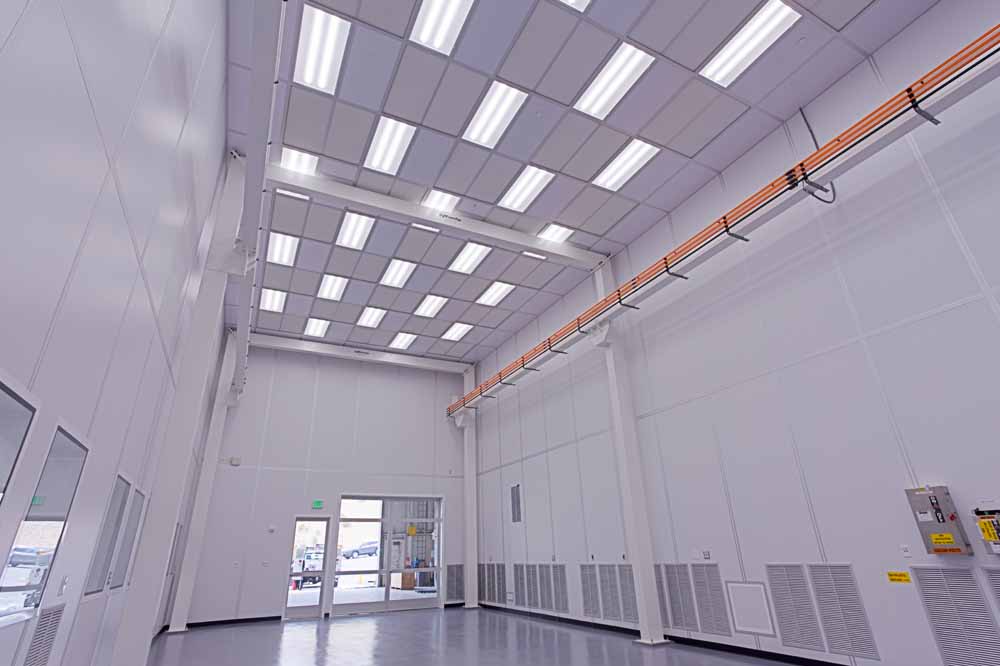
Engineers and scientists at the Department of Energy’s SLAC National Accelerator Laboratory working on the Large Synoptic Survey Telescope (LSST) gathered on May 8 to celebrate the completion of a new clean room, where they will soon begin to assemble the largest digital camera ever built.
Beginning in 2022, LSST’s 3,200-megapixel camera will take snapshots of the night sky with unparalleled detail. Over its planned 10 years of operations, it will create an archive of tens of billions of cosmic objects and their movements – a treasure trove for researchers studying all kinds of astronomical phenomena.
“The completion of the clean room is a big milestone for the lab,” said LSST Director Steven Kahn. “It’s the first major piece of LSST infrastructure here at SLAC.” The achievement comes only weeks after another project milestone: the beginning of construction for the telescope at its future site in Chile.
Having a clean environment for the assembly of LSST’s camera is necessary because any dust settling on the image sensors would degrade the quality of the precision device. The air inside the new facility is about 1,000 times “cleaner” than ordinary air. The main 1,875 square feet workspace has a ceiling height of 24 feet so that the approximately 10-feet-long camera body can be mounted vertically for optical alignment and final testing.
“Getting the clean room built took a lot of work by many people,” said Aaron Roodman, SLAC’s system scientist for the LSST camera integration and testing. “It’s due to their efforts that we got it done in only eight months.”
The day of the opening ceremony turned out to be the only day that visitors were allowed to go inside without an escort, special training and “bunny suits,” the full-body gear worn in clean rooms.
Among the attendees were researchers of the LUX-ZEPLIN dark matter project, who are building a test stand for their experiment right next to LSST’s clean room. Both facilities are located at SLAC’s “Interaction Region 2,” the former home of the BaBar particle physics experiment at the PEP-II collider.
“It’s very exciting to have our clean room in this location,” said SLAC’s Nadine Kurita, project manager for LSST’s camera. “Many of us worked on BaBar and PEP-II before and spent endless nights here, and now we’re coming back to put the camera together.”
Researchers can now begin to fill the new facility with life. Over the next few months, they will install work benches and bring in some of their equipment. The camera assembly will be spread out over the next four years.
For questions or comments, contact the SLAC Office of Communications at communications@slac.stanford.edu.
SLAC is a multi-program laboratory exploring frontier questions in photon science, astrophysics, particle physics and accelerator research. Located in Menlo Park, Calif., SLAC is operated by Stanford University for the U.S. Department of Energy's Office of Science.
The effort to build the LSST is a partnership between public and private organizations. Financial support for LSST Design and Development comes from the National Science Foundation, the Department of Energy, and private funding raised by the LSST Corporation, a non-profit 501(c)3 corporation formed in 2003, with headquarters in Tucson, AZ. Contributions from private foundation gifts, grants to universities, and in-kind support from laboratories and other LSST Member Institutions were key to early construction and critical developments. The LSST Project Office for central management was established as an operating center under management of the Association of Universities for Research in Astronomy (AURA). The Department of Energy funded effort is managed by the SLAC National Accelerator Laboratory (SLAC). Learn more at lsst.org.
SLAC National Accelerator Laboratory is supported by the Office of Science of the U.S. Department of Energy. The Office of Science is the single largest supporter of basic research in the physical sciences in the United States, and is working to address some of the most pressing challenges of our time. For more information, please visit science.energy.gov.

Services | Cleanrooms | Components | Our Projects | About Us | Request A Quote | News
Corporate Headquarters: 1392 Industrial Drive Tustin, California 92780 | Toll-Free: 800-772-6634 | Local: 714-258-7700
Copyright © 2025 Clean Rooms West LLC. All Rights Reserved